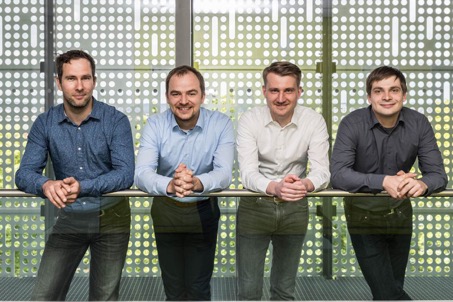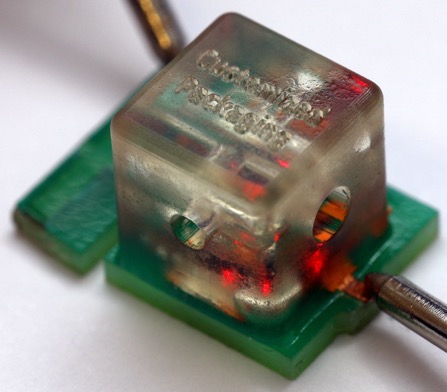A team of four from the Chair of Packaging and Connection Technology for Electronics at the TU Dresden revolutionizes the production of electronic and microtechnical assemblies by using 3D manufacturing technology with the aim of combining the advantages of mass production with the manufacture of individual individual pieces. Especially medium-sized companies get the opportunity to build up new business fields by ‘Rapid Electronic Manufacturing’ or the production of individual assemblies without high set-up costs.
Rethinking electronic manufacturing? Electronic components no longer soldered directly to a printed circuit board? Do you want to completely omit the printed circuit board and integrate the components directly into the chip housing instead? These were the questions that the four-member team at the Chair of Packaging and Connection Technology for Electronics at the Technical University of Dresden (owner: Prof. Dr.-Ing. Dr. h.c. Karlheinz Bock) faced in their research. The result is an innovative manufacturing approach that saves around half of the process and design steps. At the same time, the current – and in the future increasingly important – challenges of high-frequency transmission, cooling and miniaturization can be mastered. The technology developed for this purpose is called ‘contacting embedded components as a technology solution’, or KONEKT for short.
KONEKT revolutionizes the production of electronic and microtechnical assemblies by using a 3D manufacturing technology with the aim of combining the advantages of mass production with the production of individual single pieces. Simplified process flows enable a fast, automated production of various assemblies through the high-frequency connection of individual components while simultaneously reducing process, energy and material costs.
KONEKT team leader Tobias Tiedje emphasizes: “With KONEKT a wide variety of products can be realized in production. From 3D sensor assemblies as prototypes to RFID and high-frequency assemblies in series for the Internet of Things (IoT), the new technology offers users many design possibilities without limiting their design, creativity and innovation.
The new technology gives medium-sized companies in particular the opportunity to set up new business fields through rapid electronic manufacturing or the production of individual assemblies without high set-up costs. Within the framework of the project, the KONEKT team will establish a GmbH, which will commercially exploit the ‘Packaging-as-a-service’.
The team around KONEKT was able to obtain funding from the BMWi for an EXIST research transfer of 807,000€ with the support of ‘Dresden exists’ (the start-up service of Dresden’s scientific institutions) to enable the future production of adaptively manufactured 3D assemblies in market-ready sizes.
Project Website: https://www.avt.et.tu-dresden.de/konekt

Comparison of classic injection moulding technology with KONEKT (from left to right): classic: injection moulding technology with wirebonds; KONEKT: same component with less installation space; KONEKT: assembly with additional components

The team KONEKT (from left to right): Dr.-Ing. Andreas Krause (technology development); Dipl.-Ing. Sebastian Lüngen (plant engineering); M.Sc. Friedrich Hanzsch (commercial management); Dipl.-Ing. Tobias Tiedje (technical management) Dr.-Ing. Andreas Krause (CSO); Dipl.-Ing. Sebastian Lüngen (CTO); Friedrich Hanzsch, M.Sc. (CFO); Dipl.-Ing. Tobias Tiedje (CEO); Dipl.-Ing. Tobias Tiedje (CEO)

The electro-optical-fluidic technology demonstrator – an embedded LED in a 3D package with microfluidic channels soldered on a printed circuit board The electro-optical technology demonstrator – an embedded LED in a 3D package with microfluidic channels soldered on a printed circuit board.
The project “Contacting Embedded Components as Technology Solutions”, short: KONEKT (FKZ: 03EFMSN148) is funded by the Federal Ministry of Economics and Energy and the European Social Fund within the framework of the EXIST programme.
